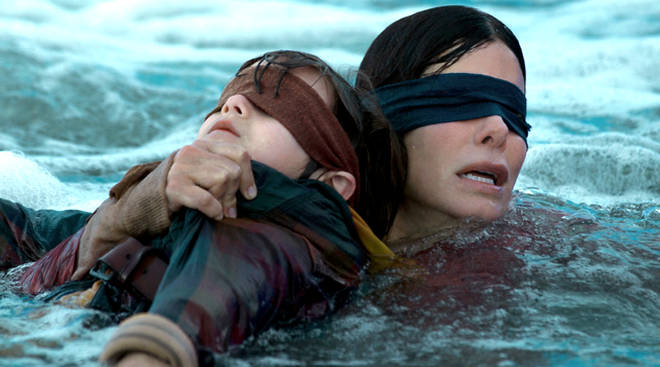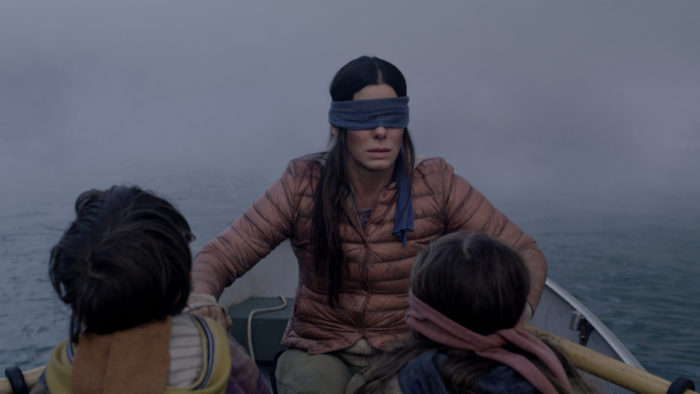Bird Box: Here’s Lookin’ at You, Kid
MAJOR SPOILERS FOR THE BIRD BOX AHEAD. DO NOT READ IF YOU PLAN TO WATCH THIS FILM.
Like most people with a Netflix account, I have seen The Bird Box starring Sandra Bullock. And like many people who watched it, I was underwhelmed. I haven’t read the book so I can’t compare the two versions, but let me say that I have a high threshold for suspension of disbelief (my public professions of love for Michael Bay movies should be sufficient evidence) but even I found the central concept of The Bird Box hard to swallow. Invisible ghosts/spirits/aliens/demons/somethings that make you kill yourself only if you look at them? At least the main idea of The Happening with Mark Wahlberg made sense (humans are a disease and the Earth dispatches antibodies to kill off the infection). The Bird Box seems to be the result of a common problem in the literary brain: I have this cool idea; now how to make it into a story? Sometimes it works, sometimes it doesn’t.
A very clever marketing manager somewhere came up with the idea of the “Bird Box Challenge” on social media and made it look like it just spontaneously showed up on the interwebs. This dull and predictable challenge has helped propel the film’s popularity and has spawned a number of memes which are sure to remain popular for a month or two. Don’t get me wrong – I don’t hate the movie. It was decently well-done and there were a few crazy moments, but when you step back and look at the whole picture, it’s hard to keep a straight face. I just wish Mark Wahlberg would have shown up with his trademark look of confusion and blurted, “It’s Happening…again!”

Image copyright Netflix
In the movie, if someones sees whatever those “things” are, they are driven to suicide. Yet some people, the mentally ill and psychotic, are compelled not to kill themselves, but to force others to look and die. And the entities are also sensed by animals (a good means of protection is keeping a bird in a box, sort of like a caged canary in a coal mine). When the bird gets agitated, it means one of the invisible monsters is around.
Applications for the film’s symbolism are abundant. Is the only way to survive life’s brutal realities to willfully blind oneself to the truth? Are dangerous principles only harmful if we give them any attention? Is it safer in the dark than in the light? Let’s take a closer look through the lens of Scripture and the Christian walk.
What could the suicide-inducing monsters symbolize, if we were to ascribe meaning to them that transcends the screen? They could be regrets or traumatic memories. In any instance, it is not healthy to focus on such things, especially as Christians. Psalms 103:12 tells us that God has removed our transgressions from us as far as the East is from the West. It doesn’t mean that past sins didn’t happen, but God remembers them no more (Is. 43:25) and neither should we (Phi. 3:13). Dwelling on our sinful past hurts our faith, or can turn us toward bitterness and malice, wanting to inflict that hurt on others as well, especially if we think they deserve it.

Image copyright Netflix
Suppose the invisible monsters symbolize sin. Is being blind to sin a good thing? Paul tells us in 1 Cor. 14:20 to be like innocent babies when it comes to evil, but like mature adults in our thinking. We should not know the ins and outs of sin or be proud of our detailed knowledge if we lived in sin in the past. It should not be viewed as shameful for a Christian to have no experience with particular sins. On the other hand, we should not deceive ourselves in thinking this or that sin doesn’t exist or isn’t all that bad. This is where thinking as adults comes in. Like the world in The Bird Box where the air is swarming with these malevolent creatures, sin and demonic powers are everywhere and it is only God’s grace and angelic protection that lets us make it through each day alive. We should be keenly aware of the horrors of sin around us, especially in the lives of those close to us. Yet we don’t have to get our hands dirty to minister to them. We don’t have to “look” in order to help them see Christ. Many people believe that you need to get down in the gutter to reach people that low. Perhaps for a short time, but you don’t have to act like them, talk like them, and live like them to somehow win them over for Christ. He doesn’t need our help to save anyone’s souls. Living lives innocent of sin has a stronger witness than any “marketing plan” we could come up with.
If you still want to see The Bird Box, go right ahead. For me personally, though, some things are better left unseen.





































Oh Gosh, I hated that movie. The only part I really enjoyed *SPOILER* is when Tom held off the invisible whatever thingies long enough to shoot the psycho before he killed himself. Being a romance lover, I like that he died to protect her.
That part was cool. There were plenty of tense moments, but just as many wasted ones.
I think what your review leaves out is it was obvious to be the Bird Box tried to capture the feeling of A Quiet Place, and did so by doubling down on the concept–even MORE restrictive restraints on family life, making even LESS sense.
I felt parts were well-acted but as a story idea, the concept just didn’t work (but then again, I think lots of modern movies have story ideas that make little sense).
That how I felt too. Some parts were very intense, but that’s like finding a good chunk of meat in an otherwise rancid stew. I havent seen A Quiet Place but across the board, everyone agrees that it’s superior.
Haven’t seen this movie, but when I saw tidbits of the previews on Netflix I was kind of like ‘ok, interesting concept, but I’m not buying the idea of three people making such a long, dangerous journey blindfolded.’
That in and of itself wouldn’t necessarily be a reason for me to avoid it, it just doesn’t seem like a movie I feel super compelled to watch.
The movie sounds like it could partly be discussing human instinct. I thought about what it would be like in that scenario, and I would feel pretty tempted to take the blindfold off, because how is someone supposed to defend themselves or run away if they can’t see? A lot of the appeal of the movie sounds like a challenge ‘can these people resist the temptation? Can they make an entire journey like that?’
There were a lot of missed opportunities to crank up the tension, especially when it came to the kids.